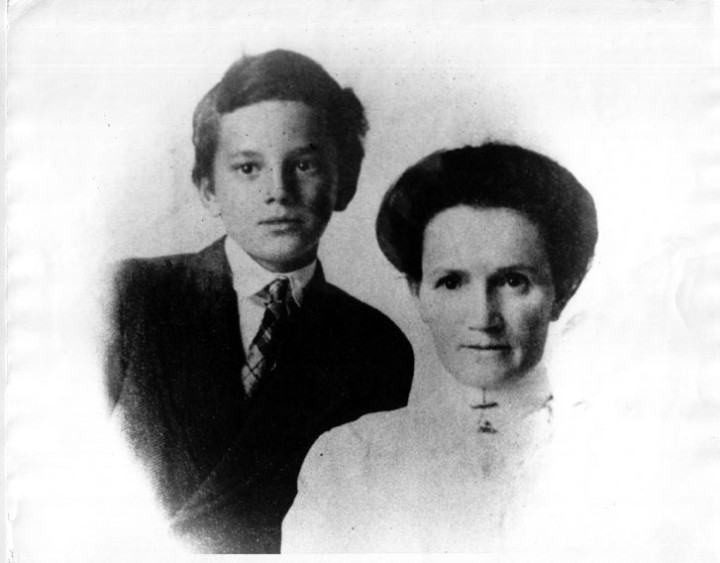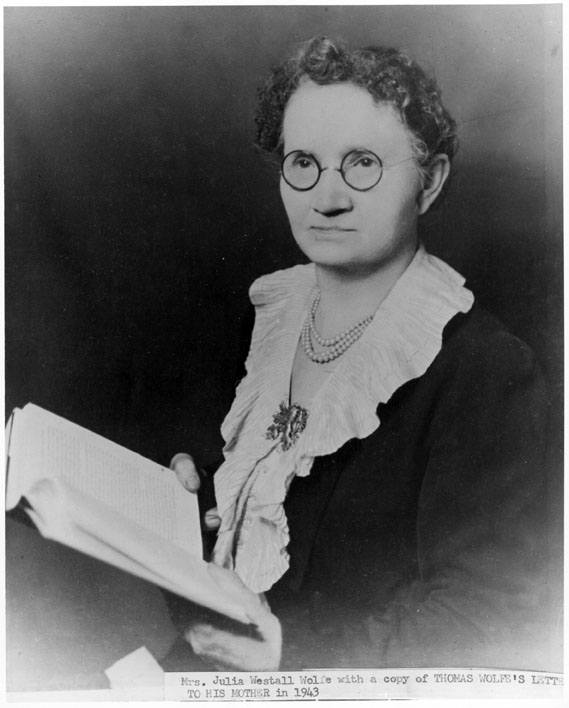On Feb. 13, 1934, author Thomas Wolfe wrote his mother, Julia, a letter, wishing her a happy birthday. Born Feb. 16, 1860, near Swannanoa, she was celebrating her 74th year. In the missive, Thomas recalls an early childhood interaction between them.
“I had just learned that two great Americans, Lincoln and Washington, had their birthday in February, and then you told me that three great Americans had their birthday in February, and when I looked puzzled you said that you were the third.”
Julia, a former teacher and bookseller turned land speculator and boardinghouse operator, was the basis for the character Eliza Gant in Thomas’ 1929 novel, Look Homeward, Angel (as well as its 1935 sequel, Of Time and the River). In writing the book, Thomas fictionalized much of his family’s and extended family’s history. His mother’s people, the Westalls, were renamed the Pentlands. The clan is described in the novel as “one of the strangest tribes that ever came out of the hills.” In the same chapter, Thomas writes:
“The Pentland family was as old as any in the community, but it had always been poor, and had made few pretenses to gentility. By marriage, and by intermarriage among its own kinsmen, it could boast of some connection with the great, of some insanity, and a modicum of idiocy. But because of its obvious superiority, in intelligence and fibre, to most of the mountain people it held a position of solid respect among them.”
Not only did Look Homeward, Angel result in Thomas’ own literary fame, but it also propelled Julia to a level of local and national recognition. Along with write-ups in the city’s papers, she was also featured in publications such as Time (May 10, 1943) and Life (Dec. 24, 1945, posthumously). At 85, she traversed the country. While in California, she was interviewed by radio host Tom Breneman. The recorded conversation exhibits her humor and quick wit, as well as the everlasting pride in her late son. (See “‘He was a genius’: Julia Wolfe talks about her son Thomas,” Dec. 23, 2015, Xpress)

In John Skally Terry’s 1943 collection, Thomas Wolfe’s Letters to his Mother, the biographer chronicles the writer’s missives to Julia. The earliest message is dated June 19, 1909, when Thomas was 8. The final note, a postcard sent from Vancouver, British Columbia, on July 6, 1938, arrived two months before Thomas’ untimely death. The 358-page book captures the intimacy between mother and son. Issues addressed within these letters range from ambition to financial strain, from success to family affairs.
The work also includes an introduction by Terry, depicting his own interactions with Julia and Thomas. In it, Terry recalls a 1934 dinner at Thomas’ small Brooklyn apartment. The meal was where the biographer first met Julia.
Terry writes:
“As I observed these two who so thoroughly enjoyed each other, but who were equally egocentric and self-assured, many of their individual traits came out in sharp perspective.
I had noticed, for example, as Mrs. Wolfe had moved calmly around the room while preparing the meal, how self-reliant she was. She absolutely refused any help; no one could really help a woman who had so much self-reliance. Her shrewd, falcon eyes, bright and piercing behind her spectacles, took in absolutely everything. Tom’s eyes were lively, dark, and piercing, but they were very large. Both gave in their eyes a sense of judging and weighing eternal evidence; they did not just look at things; they observed them. Mrs. Wolfe was more objective in her glances; Tom’s eyes revealed a highly introspective mind, sensitive, absorbing, putting all he saw into his vivid consciousness. Mrs. Wolfe often smiled or pursed her lips in a knowing manner; her mouth was small and always tight, full of will power, self-control, determination. In fact, her mouth revealed more of her feelings than did her eyes.”
Terry goes on to note the different value systems mother and son had. Julia “was deeply impressed by wealth and social power,” he writes. Meanwhile, Thomas “evaluated people more for their intrinsic spiritual power.”
Julia would die from pneumonia on Dec. 7, 1945, in New York City. The Dec. 9, 1945, edition of the Asheville Citizen-Times reported that she had made the journey north to meet with Terry to discuss the upcoming book of letters. In that same issue, the paper remembered Julia. It wrote:
“Tom Wolfe owed much to his mother. Only he could have known how deep and unpayable was his obligation. From her he inherited much of his gift for narrative and for vivid expression. An excellent storyteller, she related to the youthful Tom many of the incidents which he later incorporated in his novels in altered form. She encouraged him in his educational ambitions and made sacrifices in enabling him to realize them. His letters show how unerringly he turned to her for comfort when he was low in spirits. She found deep satisfaction in the fame which he achieved. She treasured his memory with genuine affection and in the service of that memory she made long trips which must have taxed her fading strength but never dimmed her zest for life and her insatiable interest in him. She had a vitality of body and spirit that robbed old age of its terrors and filled life with abounding activity to the very last. She was truly the remarkable mother of a remarkable son.”
Editor’s note: Thomas Calder leads occasional weekend tours at the Thomas Wolfe Memorial.




Throughly enjoyed the article and listening to Mrs. Wolfe talk about her son.. Recommend going to that webpage and listening to her sense of humor.
I enjoyed the article. I do have one small correction though. T.W.’s Letters to His Mother was published in 1943. Mrs. Wolfe gave a personally inscribed copy to my dad for his birthday or Christmas in 1943 when he was in the Army. I still have it in my Asheville home. The data below is copied from an advertisement on tbclrarebooks.com for another signed copy for sale for $850!
——-
THOMAS WOLFE’S LETTERS TO HIS MOTHER. Edited by John Skally Terry. Signed.
New York: Charles Scribner’s Sons, 1943
Thanks Mike! I’m making the correction now.
Isn’t there a recording of Julia Wolfe talking (heard through an old fashioned telephone handset) at the visitor center building of the Wolfe Memorial?
Mrs. Wolfe’s voice can be heard in this youtube video which is a recording of her appearance on a radio show. Give it a “like” so it stays available. https://www.youtube.com/watch?v=dJnXma9aeD4&t=6s